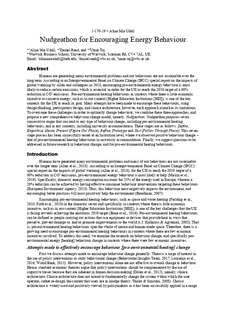| dc.description.abstract | Humans are generating many environmental problems and our behaviours are not sustainable over the long term. According to an Intergovernmental Panel on Climate Change (IPCC) special report on the impacts of global warming by Allen and colleagues in 2018, encouraging pro-environmental energy behaviour is most likely to reduce carbon emissions, which is essential in order for the UK to reach the 2050 target of a 60% reduction in CO2 emissions.
Pro-environmental heating behaviours in contexts where there is little economic incentive to conserve energy, such as in our context (Higher Education Institutions [HEI]), is one of the key contexts for the UK to reach its goal. Many attempts have been made to encourage these behaviours, using design-thinking, participatory design, and choice architecture, however, each approach alone has its limitations.To overcome these challenges in order to optimally change behaviour, we combine these three approaches, and propose a new comprehensive behaviour change model, namely, Nudgeathon.
Nudgeathon proposes seven consecutive stages that can lead to any type of behaviour change, including pro-environmental heating behaviours, and in any contexts, including university accommodation.
These stages are as follows: Define, Empathise, Ideate, Present (Figure Out Phase), Refine, Prototype and Test (Follow Through Phase). This seven-stage process has been successfully tested at an Institution level, where we observed positive behaviour change – that of pro-environmental heating behaviours in university accommodation. Finally, we suggest questions to be addressed in future research in behaviour change, and for pro-environmental heating behaviours. | nb_NO |
